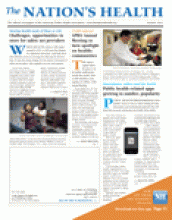In August, the Martin Luther King Jr. Memorial on the National Mall in Washington, D.C., opened to the public. The official opening ceremony, like King’s dream, had to be postponed, this time because of a hurricane.
In 1963, 100 years after the Emancipation Proclamation, leaders called people to the March on Washington for Jobs and Freedom because the nation was in crisis, with millions unemployed and segregation a reality. A flier promoting the march, now on file at Cornell University, noted that “discrimination and economic deprivation plague the nation and rob all people, Negro and white, of dignity and self-respect.”
Despite the progress that has been made since that historic march, the nation has far to go. The unemployment rate for the ongoing recession has remained at or above 8.8 percent during the past two years, according to the Economic Policy Institute, with higher rates among blacks and Hispanics. Basic rights and dignity on the job are being undermined as organized labor is attacked and weakened. Public education, seen as a major tool to guarantee social justice and equality, is on the defensive across the nation. Achievement gaps by race, ethnicity and class persist and often widen.
A recent Pew Research Center report found that the wealth gap is widening in the U.S., particularly for people of color.
The difference in household wealth — defined as the sum of household assets such as houses, cars and savings minus debt — among racial and ethnic groups is significant. For white households, median household wealth is estimated at $113,149, which is 18 times that of Hispanics, at $6,325, and 20 times that of blacks, at $5,677.
In this political climate, we find ourselves debating principles of a civil society long thought settled, that we should educate our young, care for the sick and allow our elderly to age in security and with dignity. Too often, we forget not only King’s dream, but the reality on which it is based. We allow “conventional wisdom,” our collective vision of what is possible, to be distorted and narrowed. The discussion and debate needs to be widened, our dreams need to be encouraged and unfettered.

One reasonable starting point is to review the People’s Budget for fiscal year 2012, which was released this year by the Congressional Progressive Caucus. The budget pledges to eliminate the deficit in 10 years, invest in job creation, create a fairer tax system and protect health, among other measures.
The musician and poet Carl Hines said it best in his poem, “Now That He is Safely Dead.” Published in an anthology a year after King’s death, Hines’ words still ring true today: “We, with eased consciences, will teach our children that he was a great man, knowing that the cause for which he lived is still a cause and the dream for which he died is still a dream.”
- Copyright The Nation’s Health, American Public Health Association









